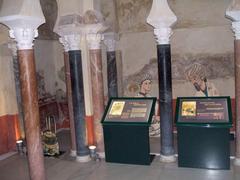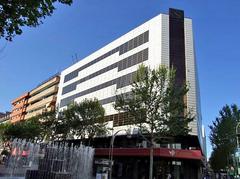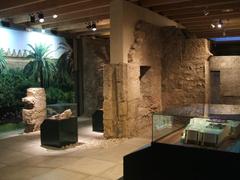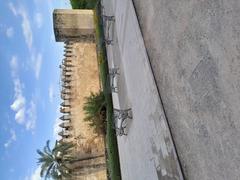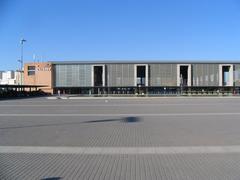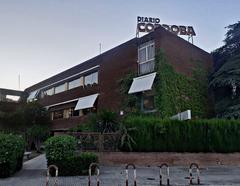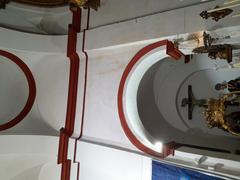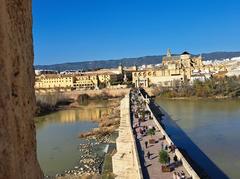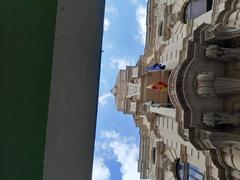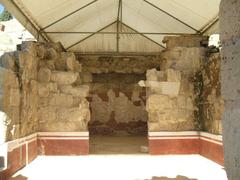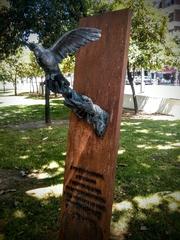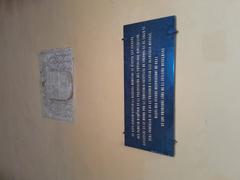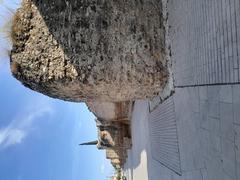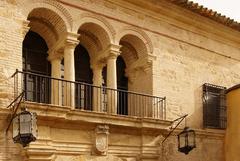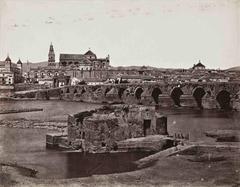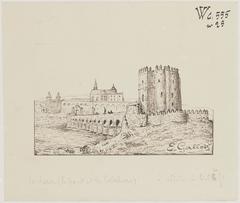Complete Guide to Visiting Fábrica De Cementos Asland in Córdoba, Spain
Date: 14/06/2025
Introduction
The Fábrica De Cementos Asland stands as a monument to Córdoba’s industrial transformation, tracing the city’s journey from agrarian landscapes to modern urbanity. Established between 1928 and 1931 under the vision of Antonio Carbonell Trillo-Figueroa and supported by Compañía General de Asfaltos y Portland Asland S.A., the factory played a pivotal role in spreading technological innovation and economic growth throughout Andalusia (artearqueohistoria.com). As one of the earliest producers of Portland cement in Spain, Asland Córdoba contributed significantly to the modernization of the city’s infrastructure and the broader region.
While the factory itself is not a traditional museum, its presence continues to intrigue visitors interested in industrial heritage, architectural innovation, and local history. This guide delivers an in-depth exploration of the Fábrica De Cementos Asland—its origins, evolution, and how you can experience its legacy today.
Table of Contents
- Historical Background
- Visiting Information
- Nearby Attractions & Travel Tips
- Frequently Asked Questions (FAQ)
- Conclusion & Call to Action
- Sources and Further Reading
Historical Background
Origins and Foundation
Founded between 1928 and 1931, Fábrica De Cementos Asland Córdoba was part of a wider wave of industrialization sweeping through Spain. Antonio Carbonell Trillo-Figueroa led the establishment of the factory, partnering with the renowned Catalan firm Compañía General de Asfaltos y Portland Asland S.A., which had pioneered Portland cement production in Castellar de n’Hug, Catalonia, since 1904 (reindustrialheritage.eu). The Córdoba facility brought this technological leap to southern Spain, reinforcing the city’s industrial ambitions (artearqueohistoria.com).
Asland’s Expansion and Technological Innovation
The factory’s foundation coincided with Córdoba’s transition from an agricultural economy to an industrial hub. The Asland brand introduced advanced rotary kiln technology and modern production processes, allowing the Córdoba plant to reach an annual capacity of 720,000 tonnes by the mid-1960s (source PDF, p.4-5). This positioned it as a major national supplier and facilitated large-scale infrastructure projects in the region.
Industrial and Social Context
The emergence of the cement factory reflected and accelerated Córdoba’s urbanization. The plant not only provided jobs but also spurred auxiliary industries, transforming the city’s socioeconomic landscape. Its products were essential in constructing homes, public buildings, and roads, and its presence catalyzed technological and social change (artearqueohistoria.com).
Architectural Features
The Córdoba facility, while inspired by the original Catalan plant designed by Rafael Guastavino, was adapted to local conditions and needs. Characterized by robust concrete, steel, and brick structures, the factory’s architecture symbolizes the era’s industrial ingenuity. Its iconic silos, conveyors, and imposing chimneys remain prominent features on Córdoba’s skyline (es.wikipedia.org).
Economic Impact and Legacy
From its inception, Fábrica De Cementos Asland was a driving force in Córdoba’s urban and economic modernization. It supplied material for transformational projects, including Expo 92 and the Centro de Ferias y Convenciones. Beyond direct employment, the factory’s footprint influenced regional development, logistics, and technology transfer.
In the late 20th century, following broader industry trends, the original Catalan site transitioned into the Museu del Ciment Asland, preserving the industrial heritage for future generations. The Córdoba plant’s historic area is recognized as an Industrial Heritage Asset by the Andalusian Historical Heritage Institute (eldiadecordoba.es).
Cultural and Historical Recognition
The story of Asland in Córdoba is increasingly celebrated by scholars, heritage advocates, and the local community. Its listing as an Industrial Heritage Asset and ongoing conservation efforts demonstrate its enduring value in the region’s collective memory (eldiadecordoba.es).
Visiting Fábrica De Cementos Asland: Practical Information
Visiting Hours & Ticketing
- Regular Access: The factory is not a conventional museum; public access is limited. However, special guided tours and educational visits are periodically organized.
- Hours: For special tours—typically Saturdays, 10:00 AM–2:00 PM (subject to change; always confirm via Turismo de Córdoba or the factory’s official site).
- Tickets: Standard admission is €8 (adults), €5 (seniors and students), free for children under 12. Tickets can be pre-booked online or purchased on site during events.
Guided Tours & Special Events
Guided tours, when available, provide insights into the factory’s history, architecture, and technological advancements. Tours are popular with educational groups, professionals, and industrial heritage enthusiasts, and include:
- Explanations of the cement production process
- Historical overview of the factory’s role in Córdoba’s modernization
- Discussions on sustainability and environmental management
Accessibility
- Mobility: The site offers ramps and accessible pathways in heritage areas. Some active industrial zones may have restricted access.
- Languages: Tours are mainly in Spanish; English and other languages may be arranged in advance.
Location & Facilities
- Address: Avda. Agrupación Córdoba, 15, 14014 Córdoba, Spain
- Parking: On-site parking available
- Amenities: Restrooms and basic visitor facilities provided
- Proximity: The factory is near Córdoba’s center—accessible by car, taxi, or public transport.
Safety & Visitor Guidelines
- PPE: For operational areas, visitors must wear helmets, vests, and sturdy footwear.
- Children: Allowed on guided tours with adult supervision.
- Photography: Allowed in designated areas, respecting safety and confidentiality.
Nearby Attractions & Travel Tips
Complementary Sites
- Mezquita-Catedral de Córdoba: A UNESCO World Heritage site (whc.unesco.org)
- Alcázar de los Reyes Cristianos: Fortress and gardens
- Jewish Quarter: Atmospheric historic district
- Molino Carbonell: Early flour mill, exemplary of Córdoba’s industrial roots
Visitor Tips
- Best Seasons: Spring and autumn offer ideal conditions.
- Transportation: Public buses, taxis, and on-site parking make access convenient.
- Combine Visits: Pair your tour with Córdoba’s monumental sites for a full cultural experience.
Frequently Asked Questions (FAQ)
Q: Can I visit Fábrica De Cementos Asland at any time?
A: General public visits are not available, but special tours and events may be scheduled. Check official tourism resources for updates.
Q: Are guided tours available in English?
A: Yes, with advance arrangement.
Q: Is there an entrance fee?
A: Typically, €8/adult, €5/senior/student, free for children under 12—only during special tours.
Q: Is the site accessible for people with disabilities?
A: Most heritage areas are accessible; contact in advance for specific needs.
Q: Can I take photographs?
A: Yes, in allowed areas and when permitted by tour staff.
Conclusion & Call to Action
The Fábrica De Cementos Asland is a cornerstone of Córdoba’s industrial story—a narrative of technological progress, economic evolution, and architectural innovation. Though not a traditional museum, it stands as a living monument to the city’s transformation in the 20th century. Visiting the factory—whether through a special tour or by exploring its exterior—offers unique insights into Spain’s industrial heritage.
To make the most of your Córdoba trip:
- Contact local tourism offices or the factory’s official site for tour availability.
- Download the Audiala app for up-to-date information, digital guides, and exclusive content.
- Explore related articles and landmarks to enrich your understanding of Córdoba’s diverse history.
Sources and Further Reading
- La fundación de la compañía cementera Asland-Córdoba, S.A. (1928-1931)
- Asland Museum Cement
- Museum of Cement Asland
- Exploring Fábrica De Cementos Asland: Visitor Guide
- Museu del Ciment Asland
- Tourism of Córdoba Official Website
- Patrimonio Industrial de Córdoba Desconocido
- Andalusian Historical Heritage Institute (IAPH)
Related Articles:
- Exploring Córdoba’s UNESCO World Heritage Sites
- Industrial Tourism in Andalusia: Top Destinations
- Sustainable Manufacturing Practices in Spain
Experience Córdoba’s industrial and cultural richness—where ancient monuments and industrial innovation coexist. For updates, travel tips, and in-depth guides, follow Audiala on social media and download our app for your next adventure.
